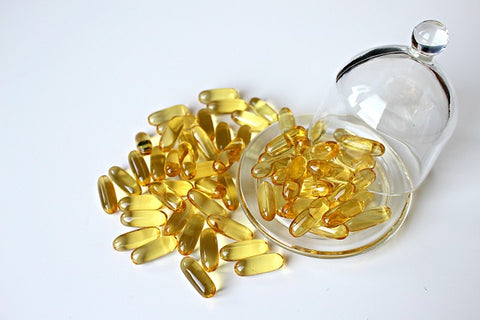Food supplements seem to be slowly becoming more and more necessary for a balanced diet. Especially for people who exercise vigorously on a daily basis or have a demanding daily life. Supplements often come to help the deficiency that exists in organically grown products that are rich in vitamins and sometimes act as a supplement for people who are deficient in certain elements and vitamins.
What are nutritional supplements?

Dietary supplements are products designed to provide nutrients that may be lacking in a person's diet. They usually include vitamins, minerals, amino acids, fatty acids or other substances that have a beneficial effect on health. The purpose of nutritional supplements is to contribute to the completion of a person's nutritional needs, especially when it is not possible to satisfy them through the daily diet.
Some examples of nutritional supplements include multivitamins, calcium, iron, Omega-3 fatty acids, protein, and probiotics. It is important to note that nutritional supplements should not be used as a replacement for a varied and balanced diet, but as a supplement when there is a lack of specific nutrients.
However, before deciding to take any supplement, you should consult your doctor or a nutritionist, as the individual need for nutritional supplements varies depending on many factors such as age, health, and lifestyle.
What nutritional supplements should I take?

Choosing the right and beneficial dietary supplements depends on many factors, and this process should be done carefully and with the advice of an expert such as a doctor or nutritionist. Some criteria that may be considered include:
Nutritional Requirements:
-
- Analyze your diet to identify potential nutrient deficiencies. A lack of specific nutrients may indicate the need for nutritional supplements.
Health status:
-
- Certain chronic conditions or hereditary diseases may require the use of nutritional supplements.
Age and Gender:
-
- Age and gender can affect nutritional needs. For example, pregnant women, children or the elderly may need more intake of a particular element.
Goals and Needs:
-
- Define your goals. For example, an athlete may need protein for muscle growth, while someone on a vegetarian diet may need iron or vitamin B12.
When do I need nutritional supplements?
The need for nutritional supplements, as we have seen above, depends on many factors, and there is no one-size-fits-all answer. However, there are certain conditions and factors that may indicate the need for nutritional supplements:
Lack of Nutrients:
If your diet does not fully cover your nutritional needs, you may need nutritional supplements to avoid deficiencies in certain nutrients.
Special Nutritional Needs:
In some cases, such as during pregnancy or breastfeeding, supplementation may be necessary to meet special nutritional needs.
Special Health Conditions:
People with specific health problems such as anemia, insufficient absorption of certain nutrients, or food allergies may require supplements.
Dietary Preferences:
People who follow special dietary preferences such as a vegetarian or vegan diet may need nutritional supplements to cover possible deficiencies.
Sports Activity:
Athletes and people who engage in intense physical activities may need supplements to support muscle growth, recovery and overall performance.
Indicative categories:
- Vitamins and Minerals: Supplements containing vitamins and minerals, such as vitamins A, C, D, E, K, calcium, iron, magnesium and others.
- Amino acids: They are the basic building blocks of proteins. Some use amino acids as dietary supplements for athletic needs or for weight management.
- Protein Supplements: Protein supplements, usually from sources such as soy, whey or plant sources, are often used by athletes and people following a protein diet.
- BHerbs and Herbal Supplements: Supplements with herbal extracts, such as geranium, ginkgo, echinacea, and others, for various purposes such as supporting the immune system.
- Weight Management Supplements: Supplements intended for weight loss, increased energy, or appetite control.
- Joint Health Supplements: Supplements that can help maintain joint health, such as glucosamine and chondroitin.
What effects can excessive use of nutritional supplements have?
>
The unrestrained use of nutritional supplements, that is, taking them without proper supervision or without a real need, can have various negative effects on health.
Increased body weight or fluid retention are some of them, as are certain organ dysfunctions. The kidneys and liver are the ones most commonly affected by overuse.
In addition, various types of complications, allergic reactions and side effects can be observed. More generally, the balance of nutrients in the body is disturbed and at the same time, unrestrained use can mask symptoms or prevent the diagnosis of health problems.
On the other hand, there are not a few cases where the excess substances are simply eliminated from the body without creating any type of complications.
Why do dietary supplements affect the liver?
The effect or burden on the liver from dietary supplements depends on the specific ingredients of each dietary supplement and their use. More generally, the liver performs some of the most basic processing processes of the nutrients we put in our body and for this reason it is also directly affected by the intake of food supplements.
Let's look at the main reasons why the liver is affected.
- Excessive Amounts of Vitamins and Minerals:
- Overuse of Protein Supplements:
Protein supplements, especially if used in excessive amounts, can lead to an increased burden on the liver, as the liver is responsible for processing and removing them.
- Herbal or Other Herbal Supplements:
Some supplements contain herbs or other plant substances that may affect liver function.
Disclaimer :)
The information in the article should not be used to diagnose or treat health problems and those seeking medical advice should always consult a licensed physician or pharmacist.

